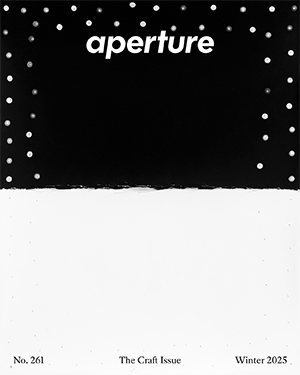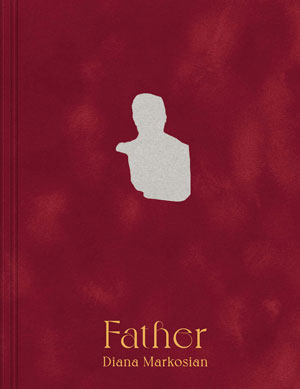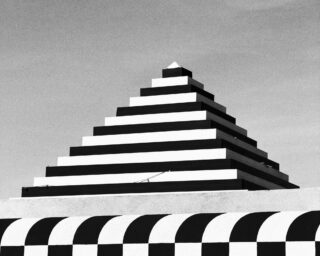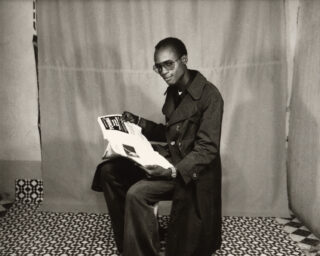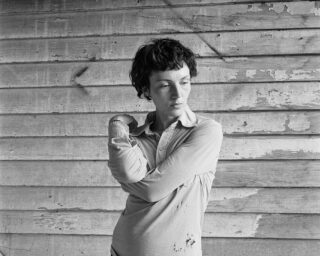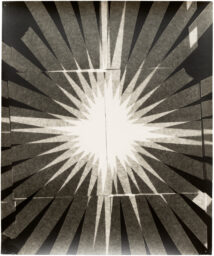If You Came Here to Have Fun, You Will
Jason Fulford is known not only for his work as a photographer and publisher of J&L Books, but also for going beyond the standard format of a book talk or signing and creating, instead, live performances or happenings that are playful and memorable. Denise Wolff, an editor in Aperture’s books program, has worked with Fulford on two recent books: The Photographer’s Playbook and This Equals That, both Aperture, 2014. Over the course of a year, Fulford and Wolff organized a series of events that involved activities, games, merchandise, flags, a live show, pancakes, and even a debate—all to bring new dimensions to the books themselves. If you ever receive a packet of mushrooms, a letter from the past (or future), or a ticket in the mail with no other explanation, it probably has Fulford’s telltale Scranton, Pennsylvania, return address. Do not discard it; event information will follow. Fulford has a letterpress in his basement and makes much of the ephemera and mailings himself, and with his wife, Tamara Shopsin. These are all part of the experience. For the new issue of The PhotoBook Review 008, Spring 2015, Fulford and Wolff discussed the parallel lives of a book through its events, and the event as intersection of artist and viewer. This article also appears in Issue 7 of the Aperture Photography App, a new biweekly publication from Aperture: click here to download the free app.

Photogram and letterpress card from the In the Dark and Behind a Wall event at Dexter Sinister, New York, March 26, 2011—the second installment of The Mushroom Collection after the Amsterdam storefront. Visitors passed small objects through a slot in the wall. The objects were converted into light and passed back through the slot.
Denise Wolff: I’ve never known you to do a standard artist talk or panel. Have you?
Jason Fulford: I give talks at universities about four times a year. I don’t like panels though. My talks are scripted so I can put in a lot of information. Then we do Q&As after. I want the audience to get their money’s worth. When I’ve been on panels in the past, I’ve left thinking the audience got cheated somehow. I’ve seen a few good panels though, where personalities clashed, and that is good content.

Hotel Oracle key tags from the New York City event at the New Yorker Hotel, October 2013. The event took place in the Tesla Room, number 3327 on the thirty-third floor, where Nikola Tesla—an inventor, electrical and mechanical engineer, and futurist—lived for the last ten years of his life.
DW: Maybe we should talk about a few of your favorite events. These are the ones I remember: the J&L variety show, the Mushroom Collector darkroom with Dexter Sinister, the Hotel Oracle world tour, the This Equals That pancakes and game, and of course, the Photographer’s Playdate festival of assignments. Are there one or two you can walk us through in particular?
JF: When my book The Mushroom Collector came out in 2010, Lorenzo de Rita, my editor and publisher of the Soon Institute, rented a storefront space in Amsterdam for one month. Our idea was to transform the book into four dimensions, bringing it into time. The space became a cross between a store and a period room. We channeled the anonymous mushroom collector who took the vintage pictures that appear in the book, and imagined what his or her workspace would feel like. Every night something in the room changed, similar to the way mushrooms appear overnight. Over the course of the month, we programmed talks and screenings and music events with different artists.

Engraved translucent plexiglass triangles that appeared overnight in the Mushroom Collection storefront space in Amsterdam, 2010. Each triangle is an optical illusion. Most people read this arrangement of words as “I love Paris in the springtime.” Look again.
Back in New York, Dexter Sinister invited me to present the book in their basement space on Ludlow Street. We turned the basement into a one-day darkroom, and built a Malevich-inspired wall. Visitors were invited to bring an object and pass it through the wall, where I converted it into light and removed one dimension by making a photogram. Each visitor received the object back in its new form: a matte barite print. I made about 150 prints that afternoon. We were really sweating behind the wall, listening to Mississippi Records and eating Clif bars.
Around the time Hotel Oracle came out in 2013, Lorenzo and I were having a conversation about the French writer Georges Perec. He wrote an essay describing the perfect Parisian apartment. Each room was in a different neighborhood, in a different type of building, on a different floor, etc.—each location well-suited to the function of the room. It occurred to us that the Hotel Oracle exists all over the world, in pieces, like Perec’s apartment: the room in New York, terrace in Paris, game room in Tokyo, bar in Krakow, laundry in San Francisco, pool in Los Angeles, shuttle van in Philadelphia, and wine cellar in Milan.

Button worn by the eighty-year-old “Future Jason” at the Hotel Oracle pool event in Los Angeles, February 2014. Participants were sent on a self-guided tour through time and asked to find Fulford three times in the historic, ten-floor Los Angeles Athletic Club. The three Jasons were different ages—ten, forty, and eighty—and each signed the book with a different date: 1983, 2014, and 2053.
DW: These events and happenings take a lot of planning, work, and imagination. Why do a book event this way? It seems to be about more than selling and promoting the book. Is it about creating a live experience of the book for an audience? Is it more of an excuse to have a good time? How did the event madness begin?
JF: The Mushroom and Oracle events began as book parties. But wine and cheese and stacks of books are boring. I want the events to be custom-made for the books—to take ideas from the books, and turn them into experiences. In this way the events become supplementary to the books. They’re like appendixes. They’re parallel to the book. They feel like the book. They’re also an excuse for me to play with other materials—architecture, sound, objects. They’re a chance for me to meet my readers one-on-one, which hardly ever happens otherwise.
DW: I really like the idea of the author and reader meeting each other. What was really odd is that, even though I know you, when I “met” you at the Hotel Oracle events in New York and San Francisco, I felt it was an encounter with—well, not quite a stranger, but someone else: the oracle. Did you feel you became an oracle for the event?
JF: That’s great. I’m glad it felt that way. One thing I learned about being an oracle is that equal work is done by the people who receive the message. They are the ones who bring meaning to it. I think that’s also the ideal situation when someone reads one of my books. I want the readers to think about their own lives—not mine.

Hotel Oracle drink coaster from the bar event in Krakow, Poland, June 2014. The Hotel Oracle is a phantom building that appeared in various parts of the world between October 2013 to June 2014—as a room in New York, a bar in Krakow, a terrace in Paris. The events in each location explored themes from the book (such as myth, time, travel, existence, and the supernatural) through performance and interaction. As of June 2014, the hotel is closed.
DW: Do you have a good story or two about meeting your readers? Were there tears? Laughter?
JF: During the San Francisco Oracle event, I met visitors one-on-one in a dark room lit with a red bulb. I asked each person to think of something that was happening in their life at that moment, then to pick from a pile of cards. The message on the card would then relate to the thing they were thinking about. Almost all of the exchanges were intense. Some people left happy, and others more somber. In New York and Paris we did a similar exchange, but with a slide image instead of a card. The slide related to their thoughts. I’ve seen some of the people a year later, and they still remember their fortune.
DW: I remember my slide fortune was about a place called Taco Land. I do feel it was perfect for me and fit well for the whole of 2014. Long live Taco Land! What the hell was that a picture of any way? Can you reveal?
JF: That’s a teletype machine I shot at the Pavek Museum of Broadcasting outside Minneapolis.

The Mushroom Collector mailing that went out in advance of the book’s release in 2010. The Mushroom Collection project began with a set of photographs of wild mushrooms found at a flea market.
DW: Do you want to say anything about the mail? This seems to be part of the fun, and is a bit mysterious (kind of like the events themselves). Do you have more to say on this?
JF: I think we’re OK, but maybe you could mention getting the ticket in the mail?
DW: I received the ticket, which said, “If you came here to have fun, you will!! If not, you won’t!!!”, along with a single sheet of Hotel Oracle stationary. I don’t think it said what it was for or who it was from, but I knew you were behind it and that the information would follow. It was inevitable that I would go to something involving a mysterious ticket received in the mail. Who could resist? The rest is Taco Land history. Maybe I should also ask: what do you think makes a great event?
JF: It’s fun and it makes you think. Maybe you go away with something (physically). And maybe it doesn’t fully make sense until the next day or later.
